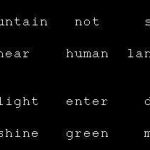2004
Matt Gorbet maintains that interactive texts remain overfamiliar to bodies trained on snowflakes and rain.
John Cayley replays what is literal and literary in the digital.
Johanna Drucker counters hands-off poetics with practice.
Computers abstract from true/false to host letters, pixels, and Nick Montfort's riposte.
Sidebar images from "Literal Art: Neither Lines nor Pixels but Letters."
Anthony Enns juxtaposes two models of German media theory in reviewing new works by Oliver Grau and Friedrich Kittler.
Jenny Weight reviews William Mitchell's third book, Me++: The Cyborg Self and the Networked City.
Jan Baetens looks 'through' and 'at' Bolter and Gromala's Windows and Mirrors and finds a foggy vision.
Joseph Tabbi reviews Joe Conte's Design and Debris and gauges the argument for chaotics-as-aesthetics across media.
Jess Loseby on "cyber-domestic" aesthetics.
Celia Pearce's position - anti-isolationist, but also anti-colonialist - derives from her understanding of "the unique properties of games themselves."
Chris Crawford considers Zimmerman's definitions.
A reply from game designer Eric Zimmerman that is receptive to multiple viewpoints, non-design or otherwise.
Jesper Juul suspects that things will remain unruly: big-budget, "cinematic" games will nose out experimental ones.
A recommendation for participatory, interdisciplinary articulations of action and perception from Mary Flanagan.
Celia Pearce hits SAVE and preserves most of Jesper Juul's essay. But then "non-computer contexts" hit the screen.
Jesper Juul takes time to complicate the real in different types of games.
Mark Bernstein explains that games have many lessons to learn from other artforms that speak to, and teach us, what it means to be human.
Asymmetries between event time and play time interest Mizuko Ito, who asks "How do you answer the door to get a pizza to nourish your flesh-and-blood body when you are in the middle of life and death online combat?"
Casting the ludology vs. narratology debate as a game in itself, Henry Jenkins brings Bible gardens and the duck-billed platypus into this defense of hybridity.
